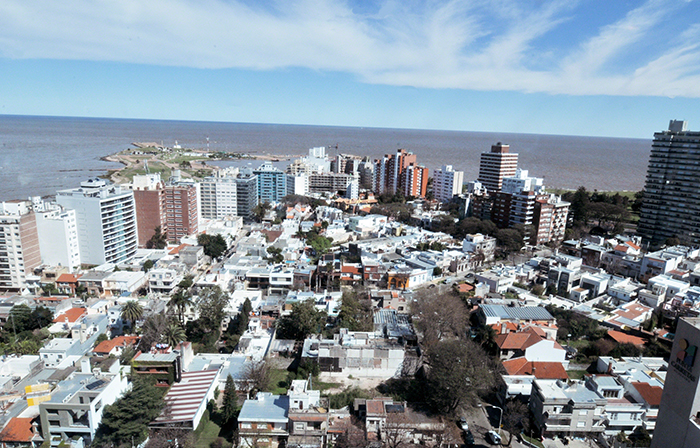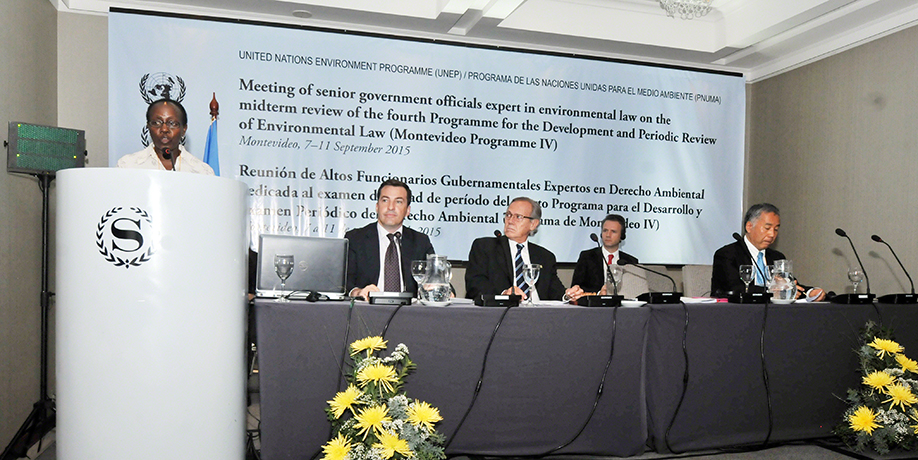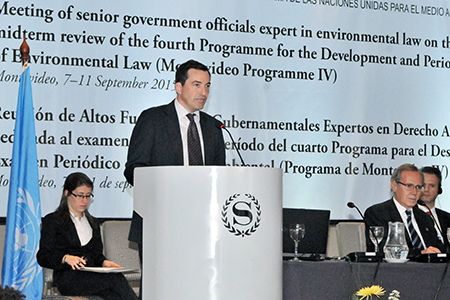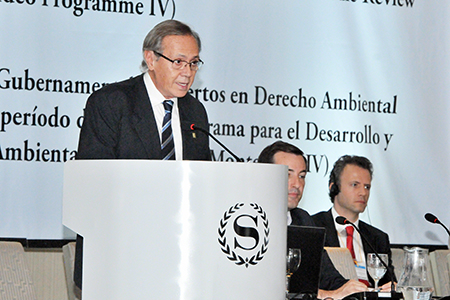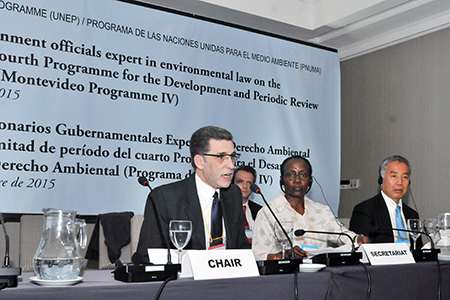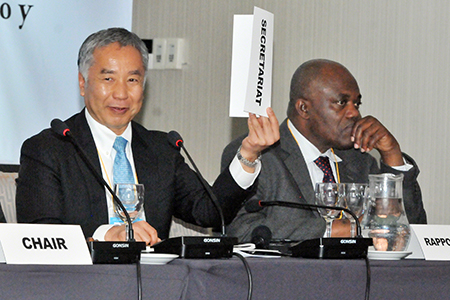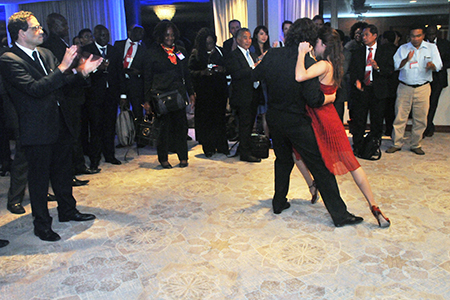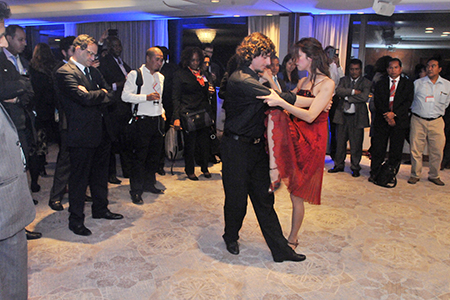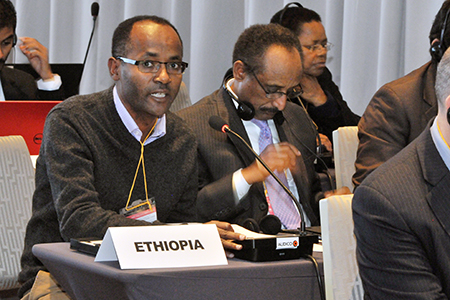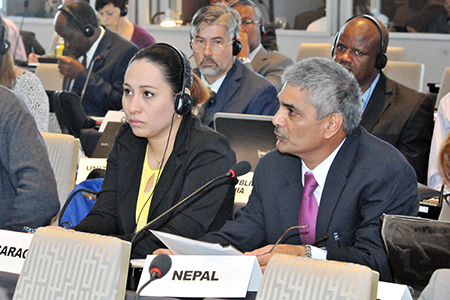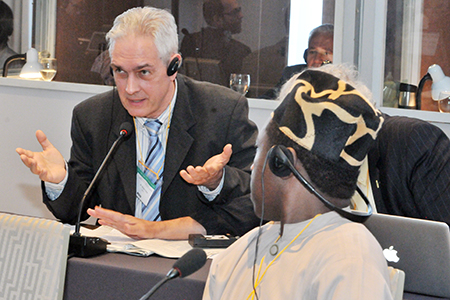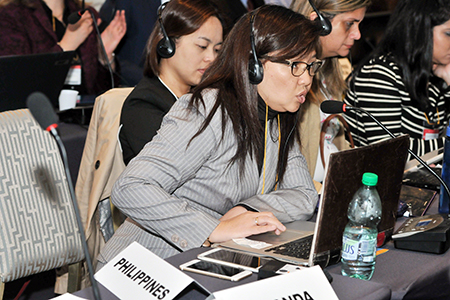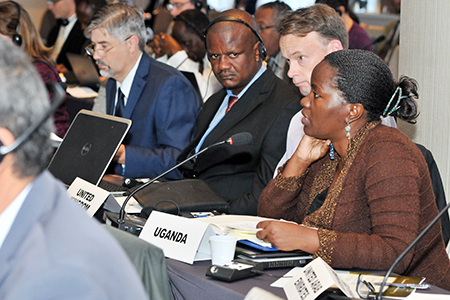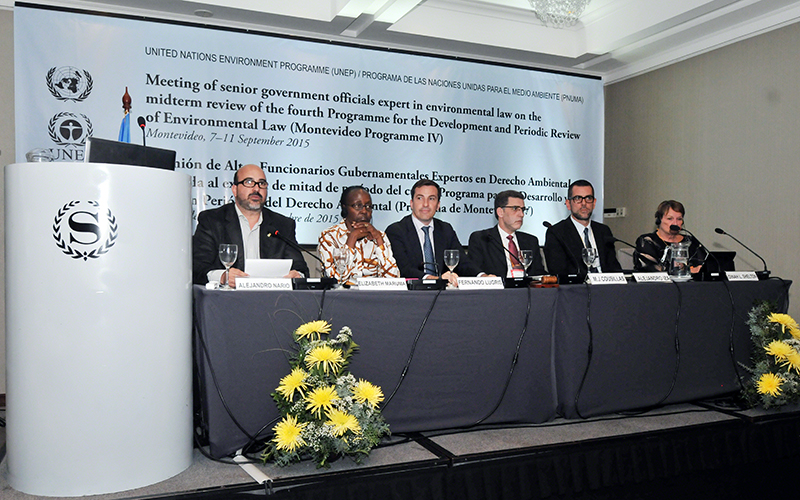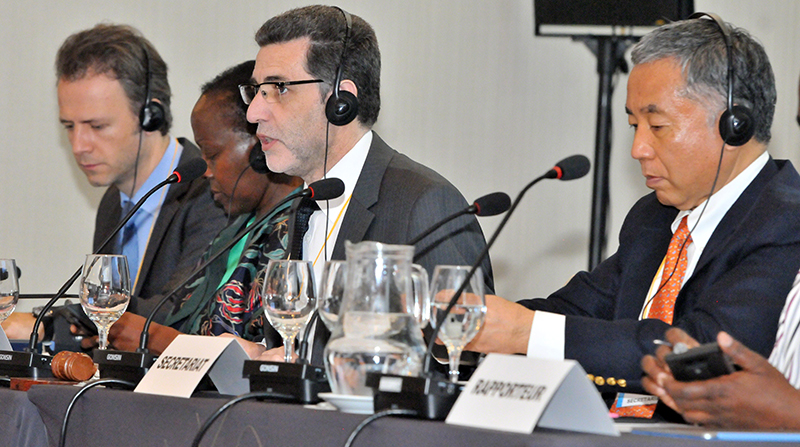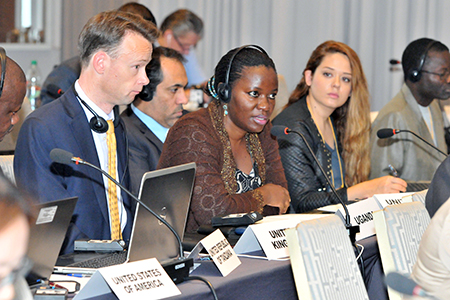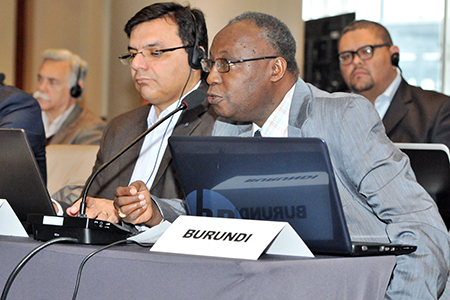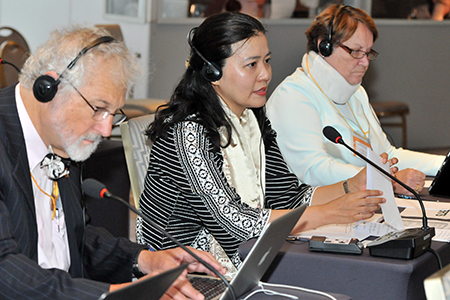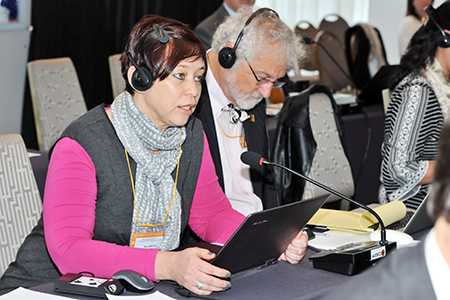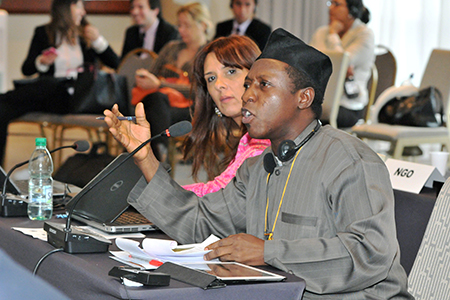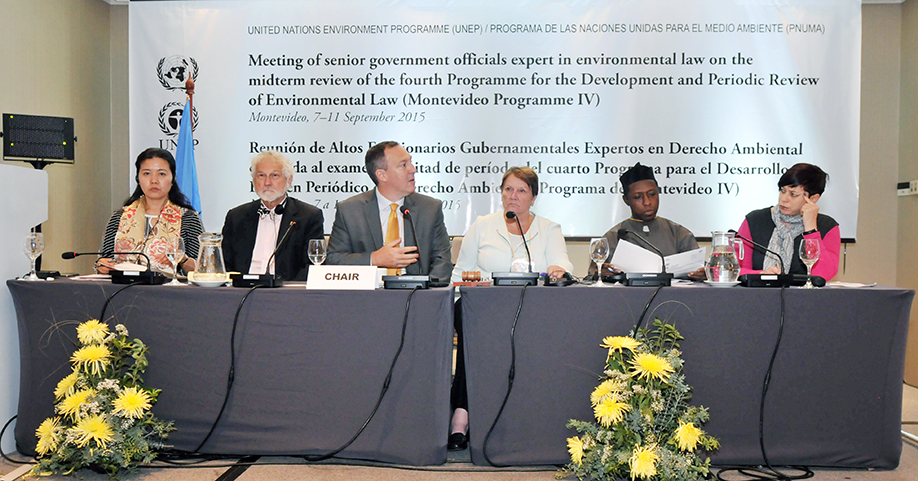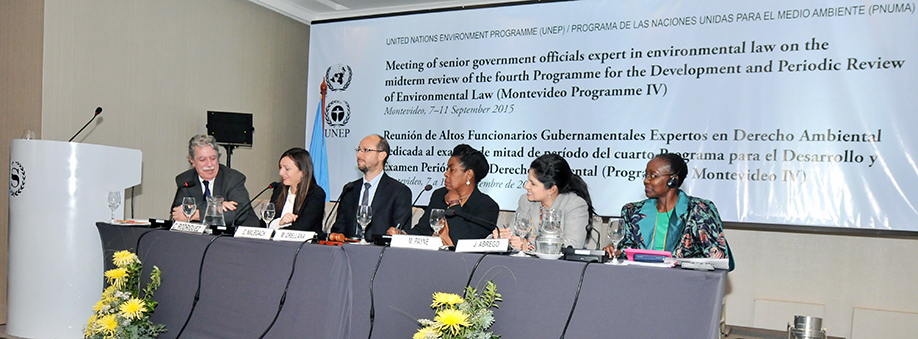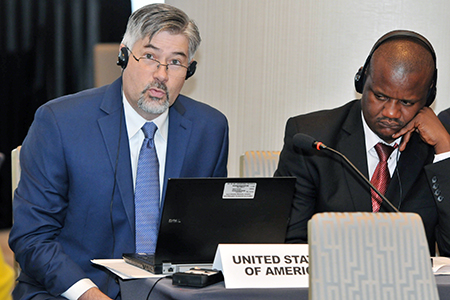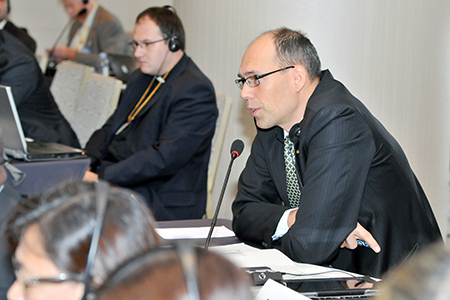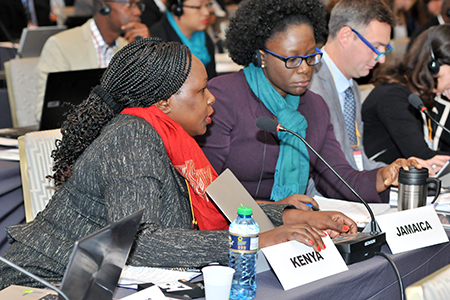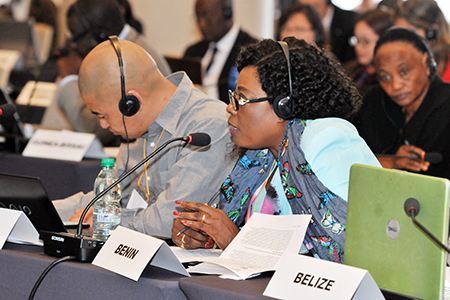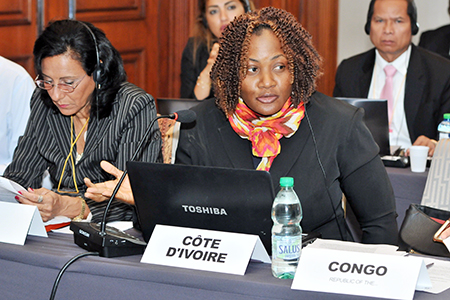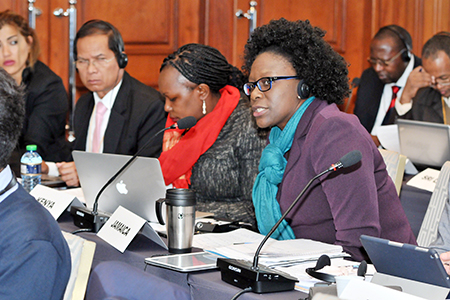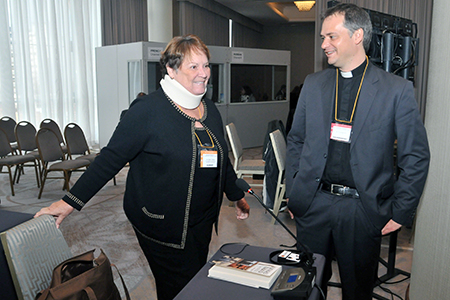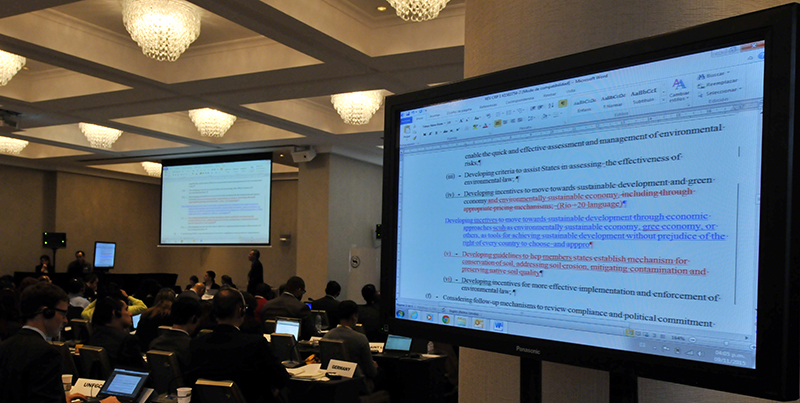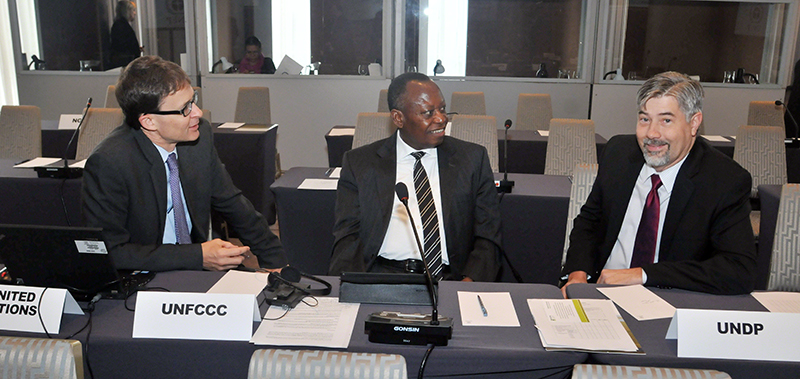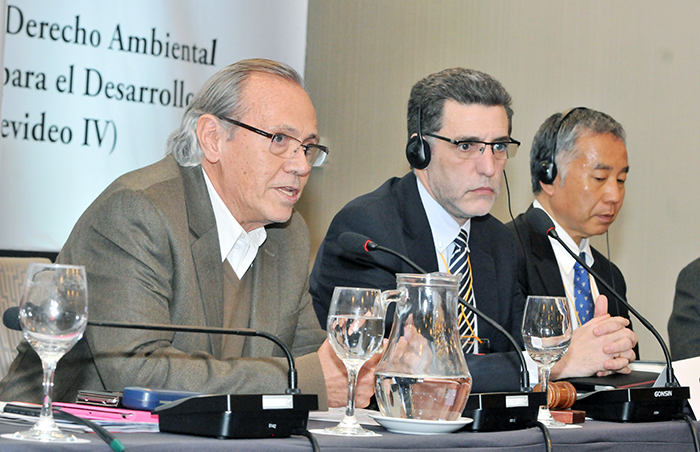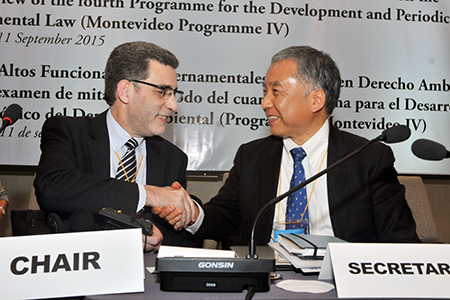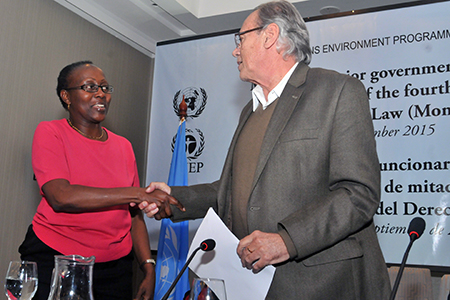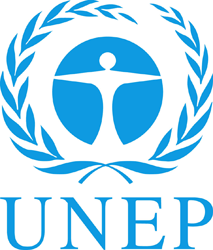Meeting of Senior Government Officials Expert in Environmental Law on the Midterm
Review of the 4th Programme for the Development and Periodic Review
of Environmental Law (Montevideo Programme IV)
7-11 September 2015 | Montevideo, Uruguay
Summary Highlights of the Meeting
Download ENB+ Meeting Report |
||||||
Receive our ENB+ bulletins and reports by email: |
||||||

| Follow @IISDRS | ||

Loading... |
||
|
Receive emailed updates with the news articles above plus related information and announcements from our SDG community mailing list: |
||
Monday, 7 September 2015
|
The meeting of the senior government officials expert in environmental law on the midterm review of Montevideo Programme IV opened on Monday, 7 September in Montevideo, Uruguay. Participants heard opening remarks from dignitaries. Elizabeth Mrema, Director, Division of Environmental Law and Conventions (DELC), UNEP, outlined progress made in environmental law since the adoption of the Programme. Fernando Lugris, Permanent Representative of Uruguay to UNEP, underscored Uruguay's role in international environmental law development, particularly in the field of chemicals and plastics debris. Jorge Rucks, Under-Secretary, Ministry of Housing, Territorial Planning and Environment, Uruguay, highlighted the Montevideo Programme as an essential tool to develop environmental instruments, guidelines and norms. Following the election of Marcelo José Cousillas, Ministry of Housing, Land Planning and Environment, Uruguay, as Chair of the meeting and Larsey Mensah, Environmental Protection Agency, Ghana, as rapporteur, discussions on the midterm review of the implementation and effectiveness of the Montevideo Programme IV began. Delegates first heard a briefing from legal experts. Topics presented included: activities taking place in the fields of the environment and human heath, trade and investment, military and security, respectively; the conservation and management of natural resources; advancements in the context of the review of Chinese environmental law; and, establishing a nexus at the global level between poverty, social justice, and equity in environmental protection. Discussions took place on the first three parts of Montevideo Programme IV: the effectiveness of environmental law; conservation, management and sustainable use of natural resources; and challenges for environmental law. Under all three parts, countries outlined national efforts undertaken. On the implementation of environmental laws and regulations, countries underscored that, inter alia, capacity building and awareness raising may be needed. On conservation and management of natural resources, countries shared experiences and concerns in management of forests, biodiversity and marine resources. On challenges for environmental law, many noted the effect of climate change on their countries, and efforts undertaken to adapt to and mitigate its effects within national policies and programmes. In the evening, delegates attended a reception hosted by the Government of Uruguay. |
||
|
+ IISD Reporting Services, through its ENB+ Meeting Coverage, has provided daily web coverage and a summary report from the Meeting of Senior Government Officials Expert in Environmental Law on the Midterm Review of the 4th Programme for the Development and Periodic Review of Environmental Law (Montevideo Programme IV). Available in ENB Mobile at: http://enb.iisd.mobi/unep-law-montevideo4/
| ||
Opening of the Meeting
|
|
|
|
Evening Reception Hosted by the Government of Uruguay
|
|
Tuesday, 8 September 2015
|
The meeting of the senior government officials expert in environmental law on the midterm review of Montevideo Programme IV reconvened for its final day on Friday, 11 September in Montevideo, Uruguay. Discussions on identifying and debating priority areas for action in the field of environmental law for the period up to 2020 were concluded, and the draft recommendations were considered. Discussions on priority areas for action addressed: promoting more coordinated and holistic approaches in international environmental law to address a broad cluster of global environmental issues, in which a possible feasibility study for a framework convention in the field of chemicals was discussed; understanding the linkages between the environment and security, with some proposing to delete this from the draft recommendations; strengthening country support for developing and adopting policies and laws; and, cooperating in an expeditious and more determined manner to secure environmental protection objectives in international trade, investment, and financial laws and policies. Discussions then turned to consider the draft recommendations that had been drawn up by the drafting group on Thursday evening. These were discussed in the morning and throughout the afternoon. Several amendments were proposed, including: development of incentives to move towards sustainable development through economic approaches such as environmentally sustainable economy, green economy or others; the undertaking for UNEP to conduct regular reviews on the implementation of the Montevideo Programme; reference to adequate and equitable access to safe water and water supply; and, a recommendation on illegal mining and illegal felling. Delegates approved the recommendations. The meeting then considered the draft report, which was adopted with minor amendments. The meeting was closed at 6:52pm. |
||
|
+ Visit the web coverage for Tuesday, 8 September 2015 | ||
Midterm Review of the Implementation and Effectiveness of the Montevideo Programme IV
|
|
|
|
|
|
|
Side Event on the Future of Environmental Law
|
Wednesday, 9 September 2015
|
The meeting of the senior government officials expert in environmental law on the midterm review of Montevideo Programme IV continued on Wednesday, 9 September in Montevideo, Uruguay. Discussions on the midterm review of the implementation and effectiveness of Montevideo Programme IV concluded in the morning, and emerging and important issues in the field of environmental law, in particular the programme areas of Montevideo Programme IV, were discussed throughout the day. In the morning, a general discussion on the midterm review of the implementation and effectiveness of Montevideo Programme IV was held. Topics highlighted during the discussion included responsibilities, human rights, excessive litigation, and types of sanctions. After hearing briefings by independent experts on recent developments in environmental law, focusing on emerging issues, participants discussed emerging and important issues in the field of environmental law, in particular in the programme areas of Montevideo Programme IV, throughout the remainder of the morning and the afternoon. Issues highlighted during the debate included noise pollution, environmental impact assessments, extractive industries, and water. During lunchtime, UNEP, the Economic Commission for Latin America and the Caribbean (ECLAC), and the Government of Uruguay presented a side event on access to information, public participation and access to justice in environmental matters. The side-event focused on cooperation for implementing the Bali Guidelines and negotiating a regional instrument for Latin America and the Caribbean. In the evening, a dialogue was held with independent experts on priorities for action. Discussions addressed: law versus political vision; more effective implementation; environmental issues dealt with in an integrated manner as part of an overarching approach; and, opportunities for capacity building. |
||
|
+ Visit the web coverage for Wednesday, 9 September 2015 | ||
Midterm Review of the Implementation and Effectiveness of the Montevideo Programme IV
|
|
|
|
|
|
|
Informal Dialogue with Independent Experts on Priorities for Action
|
Side Event on Rio Principle 10 Implementation
|
Thursday, 10 September 2015
|
The meeting of the senior government officials expert in environmental law on the midterm review of Montevideo Programme IV continued on Thursday, 10 September in Montevideo, Uruguay. The day’s discussions focused on identifying and debating priority areas for action in the field of environmental law for the period up to 2020, bearing in mind Montevideo Programme IV. In the morning, debate focused on the topic as a whole. Issues discussed included: the importance of addressing corruption that hinders effective implementation; land and soil degradation; the need for special courts to ensure environmental justice is accessible; the effect of elections and changes in government regimes on environmental law; and, the role of civil society as “watchdogs.” In the afternoon, specific areas of priority for action were considered. These included combating environmental offences and crimes, addressing drivers of environmental offences and crimes, strengthening public access to justice in environmental matters, enhancing water security in the face of climate change and other environmental pressures, standards and procedures for extractive industries, and the issue of plastic and marine wastes. As part of the afternoon discussions, a number of explicit points were raised. Specific aspects of legislation were discussed, including, inter alia, detailing types of criminal activities so that a benchmark exists, and setting out dispute resolution mechanisms. Tools to assist in implementation were also suggested, including using UNEP’s guidelines on access to justice, compiling compendia of national texts, and creating databases of relevant case histories. A drafting group met into the evening to formulate conclusions and recommendations for consideration in plenary on Friday. |
||
|
+ Visit the web coverage for Thursday, 10 September 2015 | ||
Priority Areas for Action in the Field of Environmental Law for the Period up to 2020,
Bearing in Mind Montevideo Programme IV
|
|
|
|
|
|
|
|
|
Friday, 11 September 2015
|
The meeting of the senior government officials expert in environmental law on the midterm review of Montevideo Programme IV reconvened for its final day on Friday, 11 September in Montevideo, Uruguay. Discussions on identifying and debating priority areas for action in the field of environmental law for the period up to 2020 were concluded, and the draft recommendations were considered. Discussions on priority areas for action addressed: promoting more coordinated and holistic approaches in international environmental law to address a broad cluster of global environmental issues, in which a possible feasibility study for a framework convention in the field of chemicals was discussed; understanding the linkages between the environment and security, with some suggesting that this text be deleted; strengthening country support for developing and adopting policies and laws; and, cooperating in an expeditious and more determined manner to secure environmental protection objectives in international trade, investment, and financial laws and policies. Discussions then turned to consider the draft recommendations that had been drawn up by the drafting group on Thursday evening. These were discussed in the morning and throughout the afternoon. Several amendments were proposed, including: text on soil conservation; development of incentives to move towards sustainable development through economic approaches such as environmentally sustainable economy, green economy or others; the undertaking for UNEP to conduct regular reviews on the implementation of the Montevideo Programme; reference to adequate and equitable access to safe water and water supply; and, a recommendation on illegal mining and illegal felling. Delegates approved the recommendations. The meeting then considered the draft report, which was adopted with minor amendments. The meeting was closed at 6:52pm. |
||
|
+ Visit the web coverage for Friday, 11 September 2015 | ||
Priority Areas for Action in the Field of Environmental Law for the Period up to 2020,
Bearing in Mind Montevideo Programme IV
|
|
|
Closure of the Meeting
|
|
|




